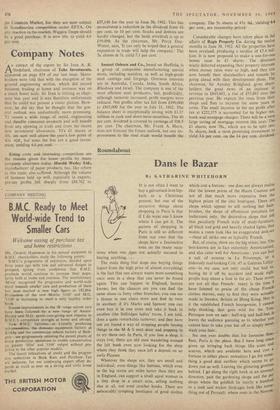Company Notes
N extract of the report by Sir Ivan A. R.
Stedeford, chairman of Tube Investments, appeared on page 839 of our last issue. Share- holders were told that with the exception of the general engineering section, which did record business, trading at home and overseas was on a much lower scale. Sir Ivan is retiring as chair- man this year and it was therefore unfortunate that he could not present a rosier picture. How- ever, he did say that he thought that the gen- eral outlook was undoubtedly more promising. TI covers a wide range of metal, engineering and durable consumer products and will benefit from any upswing in trade and from the recent new investment allowances. Ti's £1 shares at 60s. are now well above the year's low point of 43s. 44d., but none the less are a good invest- ment, yielding 4.6 per cent.
Rising costs and increasing competition are the reasons given for lower profits by many company chairmen today. Harold Wesley Ltd., manufacturer of paper products, has, like others in this trade, also suffered. Although the volume of business held up well, especially in exports, pre-tax profits fell sharply from £88,762 to £57,140 for the year to June 30, 1962. This has necessitated- a reduction in the dividend from 16 per cent. to 10 per cent. Stocks and debtors are hardly changed, but the bank overdraft is up at £99,000. As the chairman, Mr. Percy Day- Winter, says, 'It can only be hoped that a general expansion in trade will help the company.' The 5s. shares at 7s. yield 7.1 per cent.
Samuel Osborn and Co., based on Sheffield, is a group of companies manufacturing special steels, including stainless, as well as high-grade steel castings and forgings. Overseas interests are in Australia, Canada, India, South Africa, Rhodesia and Israel. The company is one of the most efficient steel producers, but, predictably, although turnover increased, profit margins were reduced. Net profits after tax fell from £990,000 to £803,000 for the year to July 31, 1962. The balance sheet is exceptionally strong with £1.37 million in cash and short-term securities. The 40 per cent. dividend is covered by earnings of 108.5 per cent. The chairman, Mr. Frank A. Hurst, does not forecast the future outlook, but any im- provement in the steel trade would- benefit the company. The 5s. shares at 45s. 6d., yielding 44 per cent., are reasonably priced.
Considerable changes have taken place in the affairs of Regis Property Co. during the twelve months to June 30, 1962. All the properties have been revalued, producing a surplus of £5.4 mil- lion. It is now proposed to make a one-for-one bonus issue in £1. shares. The directors wisely deferred expanding their property interests when money rates were so high, and they can now benefit their shareholders and tenants by going ahead with their development plans. The chairman, Sir Aynsley Bridgland, gives share- holders the good news of an increase in revenue to £845,603, a rise of £93,865 over the previous year. He expects the rents from their shops and flats to increase for some years to come. The small increase in the net profit after tax at £222,375 is accounted for by higher tax, bank and mortgage charges. There will be a very large saving of mortgage interest this year. The £1 shares, now 78s., which are to be split into 5s. shares, look a most promising investment to yield 3.6 per cent. on the 14 per cent. dividert0.






































 Previous page
Previous page